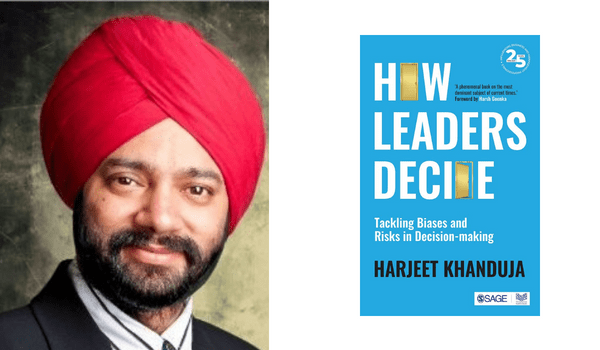The CEO of HCL Tech is reportedly the highest-paid CEO in India, receiving about Rs 130 crore in compensation. The CEO of Wipro earns about Rs 80 crore annually, while the Infosys CEO was paid about Rs 71 crore in FY 2021-22. What whopping amounts! But why are CEOs paid so much?
Is it because they make important decisions? But surely they aren’t the only ones making decisions. Aren’t managers in organisations also making equally important decisions all the time? And so much more frequently?
These are questions that have plagued all of us at some point, but only Harjeet Khanduja thought of writing a whole book on it and how!
CEOs only take ten per cent of organisational decisions, while the managers take many more. In fact, globally, managers take three billion decisions a year!
These facts are only some of the innumerable interesting ones revealed in the book, How Leaders Decide, by Harjeet Khanduja.
How decisions are made, the types and kinds of decisions that are made, group decision making, the way to block bad decisions, dynamic decision-making and how it can be used for crisis management. These are some of the topics covered in the initial part of the 25 chapters of this over 320-page book.
Just when you let all this sink in comes a pertinent chapter on how organisational philosophies can impact decision-making and the styles of decision-making.
Khanduja doesn’t just list out the four styles of decisions-making, but goes on to reveal which is the right style for growth. It is almost as if he is reading the mind of the reader. The moment the tiniest query arises, one just has to turn the page to find the answer, or move to the next chapter.
What comes through from the way the content flows is that Khanduja is a raconteur beyond compare. It is almost as if the readers are part of a storytelling session where the storyteller gives them the answers to the innumerable doubts and questions they have. And what makes everything believable are the cases and real-life examples to support each point.
When the author discusses what he aptly calls the BUMPER package of decision skills, he also reassures that each of the six skills in the package can be easily developed, provided the organisation is ready to invest in them and the individual decision makers possess the drive.
“Organisational decision-making can’t be made effective just by implementing a few models or teaching a few skills,” writes the author before enumerating how the elements of trust, ethics, diversity, creativity and health of decision-makers “influence decision-making in ways that one cannot even imagine”.
When there is so much of information, and all of it is ever so relevant and significant, it is natural to wonder ‘what exactly is the right thing to do?’ and Khanduja doesn’t fail to enlighten with an entire chapter on ethical decision-making! This is followed up with one dedicated to the recipe for high-quality decision-making.
He doesn’t just tell us that creativity is contagious, but explains the process of creativity and teaches how to create a creative environment. He throws light on decision fatigue and how it affects decision-making.
“Passion comes from loving what you do” , and there is no doubt that Khanduja is passionate about writing and storytelling, just as he is about speaking, inventing, influencing and leading.
So many aspects to decision-making can only strike someone who possesses the maturity to analyse the subject from every angle.
If you are thinking the book is only about decision making, wait till you read the chapter on ‘indecision’, where he talks of ways to fix ‘indecision’. A part of this enlightening volume is dedicated to bias — authority bias, comfort zone bias and conformity bias.
Decisions can keep changing daily as they “come with an invisible expiry date”. If one fails to execute decisions promptly, they will not give the desired results. Therefore, the final chapters are about executing decisions, managing and communicating change, and evaluating the decisions.
Making decisions can be rather daunting, as Harsh Goenka himself admits in the rather inspiring foreword.
Right from the cover of this manuscript, to the quotes in every chapter and the choice of font, the book and the wisdom preserved within its pages are reflective of the author’s experience, maturity and lucidness.




1 Comment
The way you have described the book, it looks like a must read.
I am already a big fan of Harjeet Khanduja’s stories on LinkedIn.
This gives another reason.